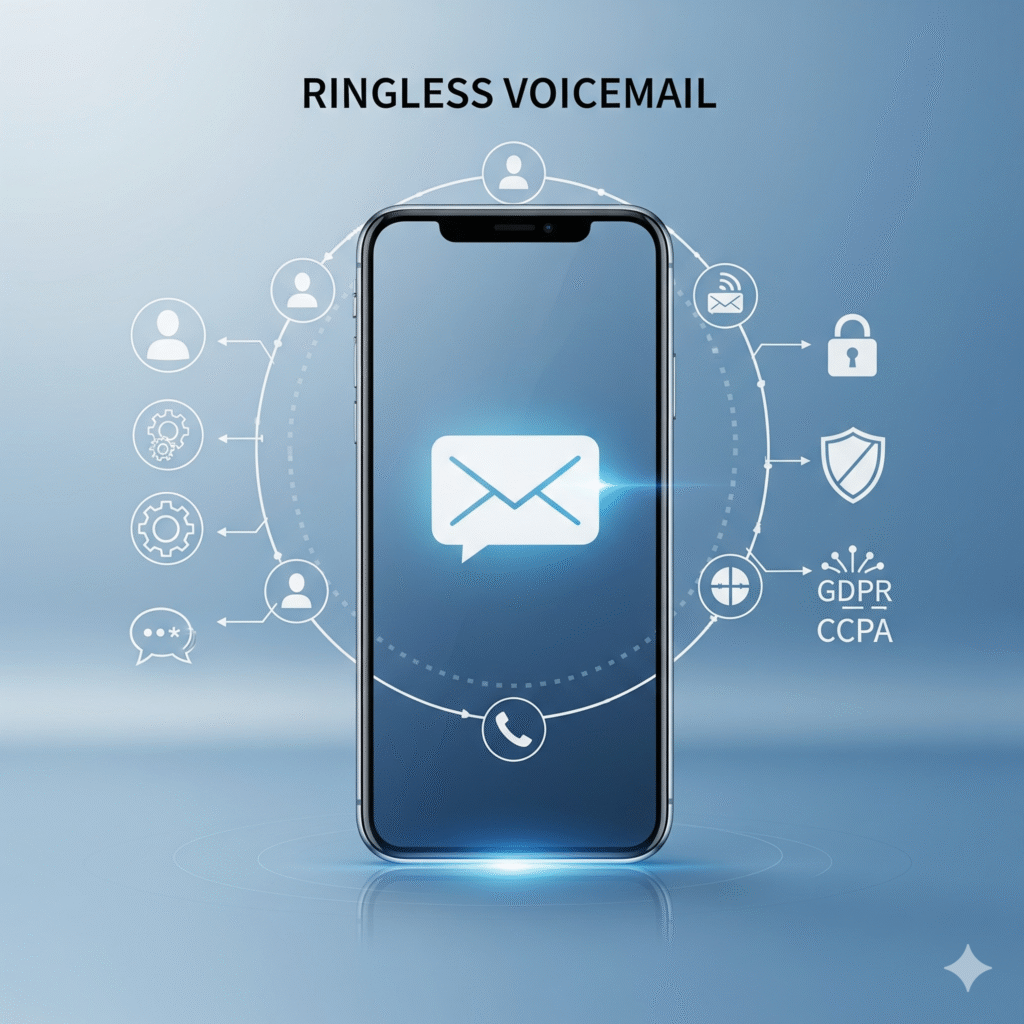In a world where customer relationships are increasingly shaped by technology, businesses face a delicate balancing act. On one side is personalization, the key to capturing attention and creating meaningful connections. On the other is data privacy, a growing priority for consumers who are wary of how their information is used.
Ringless voicemail (RVM) sits right at this crossroads. As a communication tool, it offers unique opportunities for businesses to deliver messages that feel personal, warm, and relevant without the disruption of a live call. But to unlock its full potential, companies must use it responsibly. Consumers are savvier than ever about data use, and missteps can erode trust faster than any outreach campaign can build it.
In this article, we’ll explore how businesses can leverage RVM in ways that respect data privacy, create value, and build trust. We’ll look at why personalization matters, the risks of mishandling data, strategies for balancing both goals, and how Drop.co helps businesses succeed with ethical and effective voicemail outreach.
The Rising Importance of Data Privacy
Data privacy has become one of the defining issues of modern marketing. Scandals around data misuse, stricter global regulations like GDPR and CCPA, and constant news of security breaches have left many consumers skeptical of how companies handle their personal information.
According to a recent survey by PwC, 85% of consumers wish they could trust companies more with their data, and 87% will walk away from a business if they feel their data isn’t handled responsibly. These statistics underline a stark reality: businesses that fail to respect privacy will lose not only leads but also long-term relationships.
Ringless voicemail, while innovative, must operate in this environment. If consumers feel their phone number has been used without permission, or if a message feels intrusive rather than helpful, the result could be reputational damage rather than engagement.
Why Personalization Still Matters
Despite these challenges, personalization is not something businesses can ignore. Customers expect brands to understand their needs and deliver communication that is relevant. In fact, research from McKinsey shows that 71% of consumers expect personalized interactions, and companies that excel at personalization generate 40% more revenue than those that don’t.
Ringless voicemail lends itself naturally to personalization. A warm, human voice message feels more authentic than a generic email blast. Tone, pacing, and language can be adapted to different segments whether it’s a friendly check-in for loyal customers, a thank-you for donors, or a reminder for upcoming appointments.
The real challenge is to create this personalization without overstepping boundaries. When customers feel that a brand knows “too much,” trust quickly evaporates. Striking the balance requires a clear privacy-first strategy.
The Risks of Getting It Wrong
Using RVM without a strong privacy framework can create serious risks. Here are a few common pitfalls:
- Unsolicited Messaging: If recipients haven’t opted in, a voicemail—even one that feels non-intrusive may still come across as spam.
- Over-Personalization: Using data that customers didn’t knowingly provide can create discomfort. For example, referencing personal habits or past purchases without consent can feel invasive.
- Lack of Transparency: Failing to explain why a customer is receiving a message erodes trust, even if the content is valuable.
- Regulatory Consequences: Non-compliance with privacy laws can result in fines, legal action, and reputational harm.
Consumers want to feel seen, but not surveilled. Respecting that line is what sets successful campaigns apart from those that alienate audiences.

Strategies for Balancing Personalization with Privacy
So how can businesses achieve both goals delivering relevant, personalized messages while safeguarding consumer trust? Here are several proven strategies:
1. Start with Consent
Consent is the foundation of trust. Always ensure that phone numbers are collected ethically and that customers understand they may receive messages. Clear opt-in forms and transparent language go a long way in making customers feel respected.
2. Be Transparent About Data Use
Customers should know what information you’re collecting and why. A simple disclosure “We’ll use your number to send you occasional updates and reminders” helps build confidence. Transparency eliminates the element of surprise, which is often the trigger for distrust.
3. Use Data Responsibly
Personalization doesn’t require invasive data. In most cases, segmenting by purchase history, location, or basic demographics is more than enough to craft relevant voicemail messages. Businesses should avoid referencing overly specific behaviors that might make customers feel monitored.
4. Keep Messages Helpful, Not Salesy
The more value a voicemail provides, the less likely it is to feel intrusive. Appointment reminders, loyalty rewards, event updates, or thank-you messages come across as service rather than solicitation. The goal is to show customers that you care about their needs, not just about making a sale.
5. Offer Easy Opt-Outs
Respect for choice is central to privacy. Every campaign should include a simple way for recipients to decline further messages. When customers know they can opt out at any time, they’re more likely to stay engaged voluntarily.
6. Segment for Relevance
Personalization doesn’t have to mean hyper-specific data points. Grouping customers into relevant segments ensures that messages still feel tailored without risking overreach. For instance, a nonprofit can send one voicemail to donors and another to volunteers, while a retailer can tailor promotions to repeat versus first-time buyers.
7. Invest in Secure Technology
Using secure platforms like Drop.co ensures that customer data is stored, processed, and used safely. Security is an essential pillar of privacy, and businesses should only partner with providers who prioritize it.
Building Trust Through Responsible Messaging
When done right, RVM can actually strengthen trust. A respectful, well-timed, and transparent voicemail shows customers that you value their time and privacy. It proves that personalization doesn’t have to be invasive, it can be thoughtful and service-oriented.
Consider this example: a healthcare provider sends a reminder voicemail for a patient’s upcoming appointment. The message includes a friendly greeting, the date and time of the visit, and an option to call back to reschedule. The patient feels cared for, not marketed to. This is personalization built on trust.
Contrast that with a generic sales pitch left for someone who never opted in. The result isn’t just low engagement it could damage the brand’s credibility. The difference comes down to privacy-first thinking.

Why Drop.co Is the Trusted Choice
At Drop.co, we understand that personalization without privacy is a recipe for failure. That’s why our platform is designed to help businesses reach audiences in ways that are both effective and ethical.
- Non-Intrusive Delivery: Messages go straight to voicemail without interrupting the customer’s day.
- Scalable Personalization: Businesses can send thousands of messages while still maintaining a warm, human tone.
- Privacy-First Approach: Drop.co provides secure infrastructure and supports best practices for consent, transparency, and opt-outs.
- Versatile Use Cases: From nonprofits and healthcare providers to contractors and retailers, our clients use RVM to deliver value-driven messages that respect audience boundaries.
By combining efficiency with empathy, Drop.co helps businesses create outreach strategies that don’t just meet marketing goals they build lasting trust.
The Future of Personalization and Privacy
As technology continues to advance, the tension between personalization and privacy will only grow more complex. Artificial intelligence, predictive analytics, and automation tools promise unprecedented insights into consumer behavior. At the same time, new regulations and rising consumer awareness will demand greater accountability.
Ringless voicemail will evolve in this environment, becoming even more sophisticated in how it tailors messages while respecting user preferences. Businesses that succeed will be those who see privacy not as a hurdle but as a competitive advantage. Transparency, respect, and ethical data use will be the true differentiators in the years ahead.
Practical Steps Businesses Can Take to Protect Consumer Data
Understanding the importance of data privacy is one thing putting it into practice is another. Businesses that use ringless voicemail can build trust and maintain compliance by following a set of proactive steps:
1. Adopt a “Privacy by Design” Approach
Rather than treating data security as an afterthought, businesses should integrate privacy considerations into every stage of campaign planning. This means evaluating what data is collected, how it’s stored, and who has access from the very beginning.
2. Minimise Data Collection
The more information you gather, the more you have to protect. By only collecting data that is absolutely necessary for campaign effectiveness such as phone numbers and relevant segmentation details you reduce both risk and liability.
3. Encrypt and Secure Data Storage
All customer information should be stored in secure, encrypted systems that comply with relevant regulations like GDPR or CCPA. Regular audits and penetration tests can help ensure that your safeguards remain effective against evolving threats.
4. Be Transparent with Consumers
Trust grows when people know exactly how their data is being used. Clear privacy policies, opt-in processes, and easy opt-out mechanisms show respect for customer autonomy and keep businesses compliant with regulations.
5. Regularly Train Staff
Even the most sophisticated systems can be undermined by human error. Ongoing training ensures that employees understand data privacy best practices, recognise risks, and know how to respond in case of a breach.
By taking these practical steps, businesses can align their personalization strategies with the growing demand for privacy. The result is outreach that feels respectful, effective, and trustworthy, a winning formula in the digital age.

Striking the Balance Between Privacy and Personalization
Data privacy and personalization are not opposing forces; they are two sides of the same coin. Personalization without privacy feels intrusive. Privacy without personalization feels cold and impersonal. The real opportunity lies in striking the right balance.
Ringless voicemail is uniquely positioned to deliver on this promise. It allows businesses to communicate in ways that are human, relevant, and considerate without disrupting routines or overstepping boundaries. For customers, it offers control and clarity. For businesses, it fosters trust and drives stronger engagement.
With Drop.co’s secure, privacy-first RVM solutions, companies can confidently embrace this balance. By respecting data, delivering value, and prioritizing transparency, businesses can build not only better campaigns but also stronger, long-lasting relationships.
In the age of ringless voicemail, success isn’t just about being heard it’s about being trusted.
